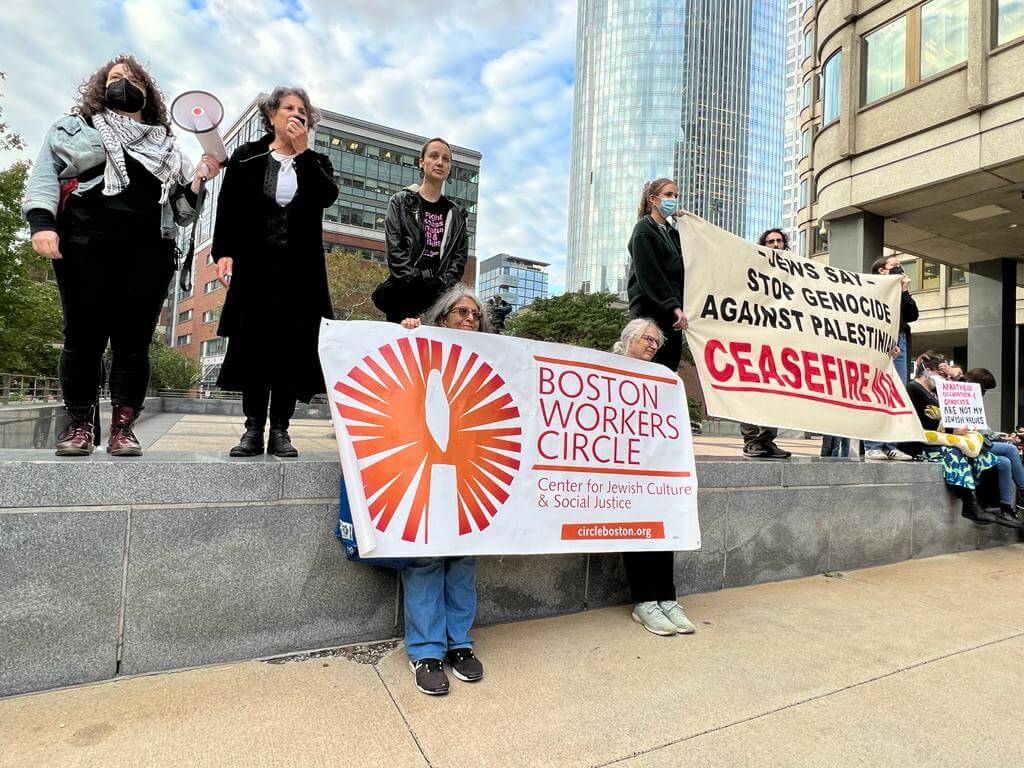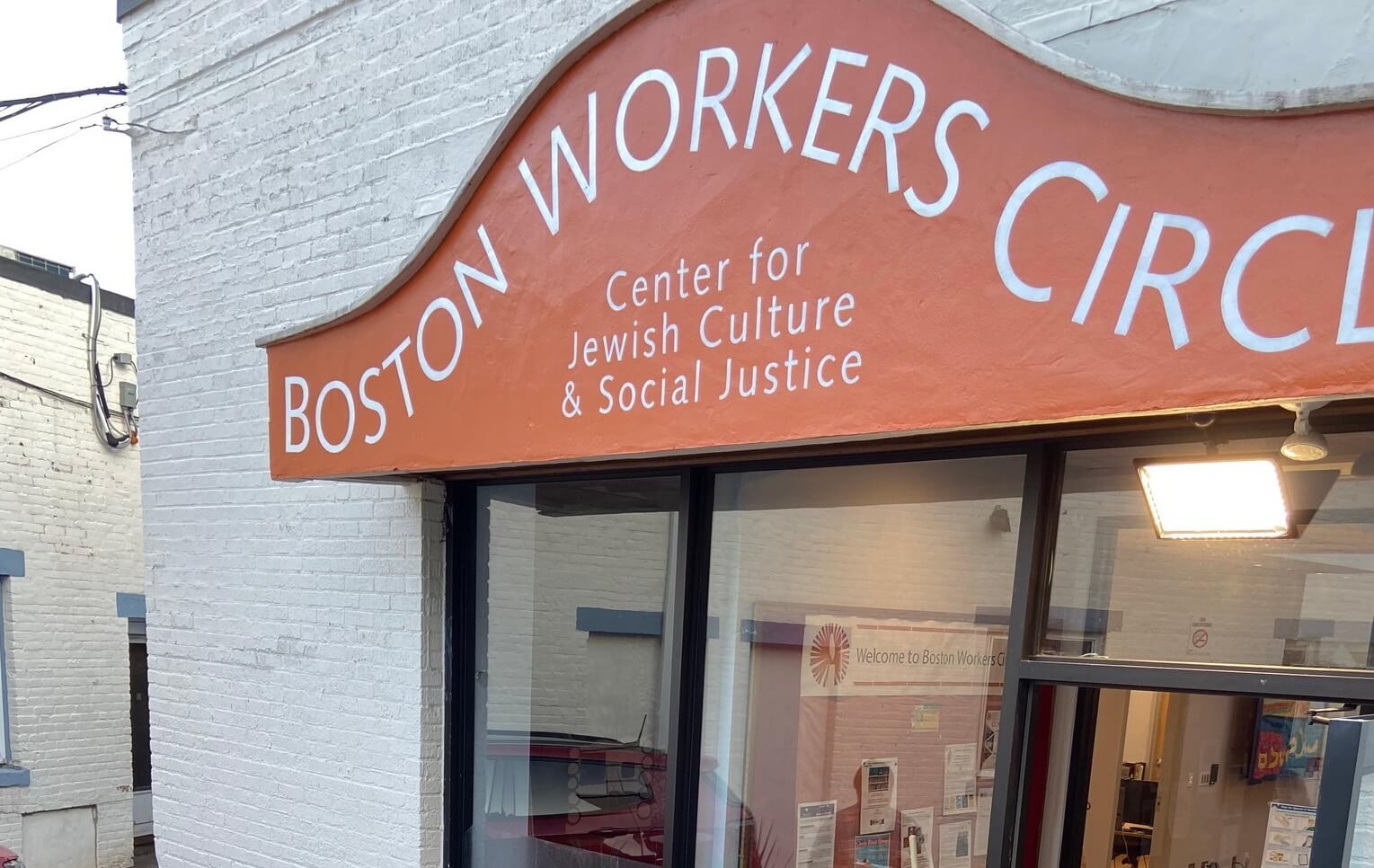Boston Workers Circle leaves local Jewish community council over Israel protest
The Boston Workers Circle withdrew from the local umbrella group after co-sponsoring a rally with Jewish Voice for Peace

Graphic by Angelie Zaslavsky
The Boston Workers Circle, the historic progressive Jewish organization, plans to withdraw from the Boston Jewish Community Relations Council.
The move comes amid pressure from the JCRC’s leadership following the Workers Circle’s decision to co-sponsor a protest last week calling for a cease-fire in Israel and Gaza.
Rebecca Hornstein, the Boston Workers Circle’s executive director, said that her organization decided to leave the JCRC voluntarily after being informed that it would face certain removal in any formal vote.
“The Boston JCRC has decided that at this moment, it is worthwhile to spend time expelling a founding member and dividing the Boston Jewish community, ensuring that an important voice is no longer at the table,” Hornstein said in a statement published late Tuesday. (Boston Workers Circle is an affiliate of the national Workers Circle organization, although the two are separate organizations. The national group was not involved in the Boston dispute.)
Jeremy Burton, director of the Boston JCRC, said Tuesday evening that his organization had accepted the Workers Circle’s resignation from the council.
“It is unfortunate that at a time when we are experiencing and expressing a profound level of Jewish unity across the world, a small minority is seeking to exacerbate fractures and divisions within our people,” Burton said in a statement.
The dispute between the Workers Circle and the Boston JCRC, which it helped found in 1944, comes as the Jewish community in the U.S. reels from a terrorist attack in Israel on Oct. 7 in which Hamas killed 1,400 Israelis and took more than 200 hostages to Gaza. Israel’s military response has killed more than 5,000 Palestinians.
“This is a very fraught time,” said Nancy Kaufman, the former director of the Boston JCRC, which represents more than 40 member organizations in the community. “There’s a lot of trauma and there’s enormous complexity.”
Kaufman said she worked closely with the Boston Workers Circle, during her time at the helm, between 1990 and 2010. She said that during that period, the Workers Circle did not work on issues pertaining to Israel.
The national Workers Circle organization, which was founded by Jewish socialists in 1900 and retains a strong emphasis on Yiddish culture, left the Conference of Presidents of Major American Jewish Organizations in August. Ann Toback, the group’s chief executive, said at the time that her group disagreed with the organization’s “reluctance to critique Israel” and its alleged conflation of anti-Zionism and antisemitism.
Boston protest at center of dispute
The dispute between the Workers Circle and the council, an umbrella group representing much of the organized Boston Jewish community, revolves around a protest last week that Workers Circle co-sponsored with IfNotNow and Kavod, another progressive local Jewish group.
The Boston chapter of Jewish Voice for Peace, an anti-Zionist group, also appeared to be involved in the event. The JCRC adopted a policy in 2019 banning its member groups from working with JVP, a move widely understood to be aimed at the Workers Circle.
The protest “in its tone, tenor, language and other co-sponsors – is clearly not aligned with the policies and resolutions of the JCRC,” Burton said in his statement.
At the time, Burton said in a statement that the council recognized that it “may ultimately separate from a venerable organization, the Boston Workmen’s Circle (BWC), a founder of our coalition and a home for many Jews in Boston who have no other Jewish space that resonates for them.”
Boston Workers Circle did not list Jewish Voice for Peace as a co-sponsor of the protest last Wednesday, which called on Sen. Elizabeth Warren, to demand a cease-fire. However, a flyer circulated by IfNotNow’s Boston chapter showed the Boston Workers Circle logo alongside JVP’s.

IfNotNow, an activist group opposed to the Israeli occupation, has been working closely with Jewish Voice for Peace, which in addition to being officially anti-Zionist also supports a boycott of Israel, on a series of protests calling for a cease-fire and an end to a “genocide” in Gaza. IfNotNow does not have a position on Zionism or the boycott movement.
The Boston Workers Circle likewise does not take a position on a boycott of Israel, though it opposes claims that it is antisemitic.
While a handful of other progressive Jewish organizations, including Jews for Racial and Economic Justice in New York City, have endorsed these protests, most others have avoided calling for a cease-fire or explicitly supported Israel’s war in Gaza, which its government says is intended to destroy Hamas.
Community divided over Israel
Both the Boston Jewish community and Jewish community relation councils nationwide have faced recent turmoil over Israel. Last summer, an online map created by pro-Palestinian activists in Boston that listed several local Jewish institutions — including a synagogue group and Jewish day school — as complicit in Israeli human rights abuses paralyzed some progressives in the community.
“The power and resources that the Jewish institutional community has makes it very difficult for the Jewish left to speak out in a clear and direct way,” one left-wing organizer in Boston said at the time, explaining why some progressives felt reluctant to criticize the so-called Mapping Project.
Nationally in recent years, community relations councils — originally founded in the mid-20th century as a unified political advocacy voice for Jews — have seen major upheaval. Most have been absorbed by their local federations, causing tension between their political advocacy, which tends to be liberal on domestic political issues, and more conservative Jewish donors. (The Boston JCRC is one of a small number of councils that exists independently of its local federation.)
The Jewish Council for Public Affairs, which long served as an umbrella group for local councils, announced last winter that it would split from the national federation system and end its formal membership-based model.
















